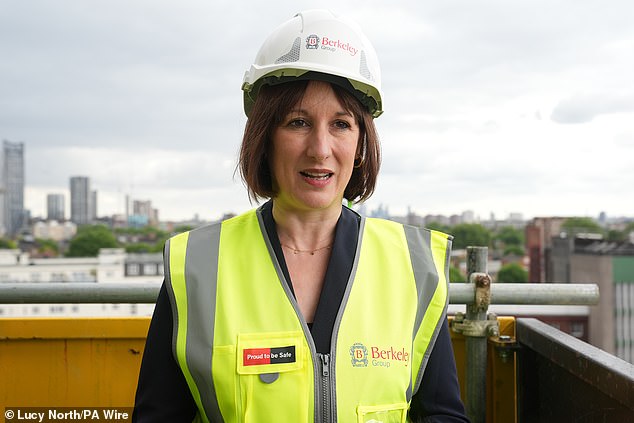Table of Contents
Who wants to be a millionaire? Many, according to the latest Global Wealth Report from Swiss bank UBS.
There are more than three million dollar millionaires in the UK, making us the third richest country in the world after the US and China.
But UBS also predicts the number will fall by 500,000 over the next five years, as the wealthy leave the country or perhaps simply lose their wealth.
If this is the case, it will be by far the most extreme case in the world. The only other place where the number of millionaires is projected to decline is the Netherlands, and by a much smaller amount.
Who wants to be a millionaire? Many of us do, according to the latest Global Wealth Report from Swiss bank UBS
Everywhere, the ranks of the rich will grow: in the United States and China, of course, but also in Japan, Germany and France, where the total will overtake us as we go down.
It’s a devastating conclusion. These are not the super-rich who are ridiculed in Cole Porter’s wonderful song with Celeste Holm and Frank Sinatra in the 1956 film High Society.
These were not people who wanted to travel on a giant yacht, have flashy lackeys or luxuriate in champagne.
The bar to be cleared to become a dollar millionaire is to have assets worth £770,000, a different order of magnitude than in the 1950s.
But it is these people, whom wealth managers call “the millionaires next door,” who pay out huge amounts of taxes.
The top 1 percent of earners pay about 30 percent of the income tax bill, plus capital gains tax, stamp duty and all other additional taxes.
This is the highest proportion of revenue in 30 years, perhaps longer. Last year £277bn was collected in income tax, of which around £80bn came from them.
That top 1 percent is actually a somewhat smaller group than the millionaires in UBS’s tally, but you get the idea.
Even a relatively small exodus of high-income earners would have a devastating impact on tax revenues.
Economists’ predictions should be taken with caution.
But UBS, which now incorporates Credit Suisse, has been producing this wealth report for 15 years, so it knows what it’s doing. As one of the world’s largest wealth managers, in some ways the largest, it understands how the rich think.
On the other hand, people often say they are moving to a new country for tax reasons and then end up staying. So we need to look at what people do, not what they say.
Economists call it revealed preference, and it’s a useful antidote to all the opinion polls that make headlines.

Here’s hoping: The hope is that Rachel Reeves is sensible.
We know that some wealthy people have already left the UK. Several wealthy Russians have left as a result of Vladimir Putin’s actions.
Overall, the number of non-domiciled people has fallen from about 125,000 in 2010-16 to about 74,000 last year, largely due to the Conservative government’s tightening of rules, with a modest loss of revenue as a result.
There have also been some high-income earners who have moved to the continent after Brexit, and some countries, notably Italy and Portugal, have special tax arrangements for them if they do so. In Italy, there is no tax on half of income, an important incentive.
So far at least the movement appears limited.
Paul Donovan, chief economist at UBS Wealth Management, cited Russians leaving as a result of sanctions and “millionaire non-indigenous populations moving to low-tax places like Dubai and Singapore.”
What would be worrying is if high-income earners who would otherwise have stayed in the UK made the same choice, and those starting businesses here decided to do so somewhere where the tax regime was more favourable.
A hope and a worry. The hope is that Rachel Reeves will be sensible. If there is real evidence of an exodus and a fall in tax revenues, she will take steps to stop it.
The concern is that the people around her, the smart 35-year-old men who advise her and many members of the Cabinet, do not understand how those who earn a lot of money in the private sector behave.
I think UBS is probably too pessimistic, but if she is right, she – and we – are in serious trouble.
We’ll need to watch that Celeste Holm and Frank Sinatra clip to get our spirits up.
DIY INVESTMENT PLATFORMS

AJ Bell

AJ Bell
Easy investment and ready-to-use portfolios

Hargreaves Lansdown

Hargreaves Lansdown
Free investment ideas and fund trading

interactive investor

interactive investor
Flat rate investing from £4.99 per month

eToro

eToro
Stock Investing: Community of Over 30 Million

Trade 212

Trade 212
Free and commission-free stock trading per account
Affiliate links: If you purchase a product This is Money may earn a commission. These offers are chosen by our editorial team as we believe they are worth highlighting. This does not affect our editorial independence.
Some links in this article may be affiliate links. If you click on them we may earn a small commission. This helps us fund This Is Money and keep it free to use. We do not write articles to promote products. We do not allow any commercial relationships to affect our editorial independence.



